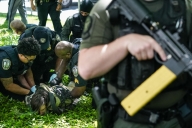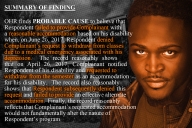You have /5 articles left.
Sign up for a free account or log in.
With less than a month until the semester begins, an Israeli higher education institution hit hard by Hamas’s Oct. 7 attacks is still healing from the trauma—but already driving long-term changes to revitalize its surrounding area.
Located near Sderot, just kilometers from the wall separating Israel from the Gaza Strip, Sapir Academic College is one of Israel’s largest public institutions, usually a bustling campus of more than 8,000 students. Now, more than a dozen of its community are dead and scores more have yet to return to their homes.
“Things have dramatically changed for us. What’s happening now is off the charts,” said Amit Marantz-Gal, an English lecturer and former head of its international office.
Sapir is no stranger to security threats. Hamas missile strikes on the area have previously targeted the university, a large gathering center. Twelve years ago, Marantz-Gal’s car was bombed. Such tales aren’t rare. Still, she said, recent events have been like nothing experienced before.
“The idea was to stop repeating the narrative that we’re constantly under attack and to move on to a narrative of academic merit. Now, dozens of alumni, students, faculty and staff were murdered,” she said.
In the hours after the initial attack, Marantz-Gal, who doesn’t live in the immediate area, and other faculty who weren’t displaced leaped into action.
“Those of us who could function split among ourselves, took lists of students and started calling everybody. Twenty-four to 48 hours later, we sent out a form for the entire Sapir community for everyone to say where they were, what they needed.”
Some 250 faculty and staff members and more than 1,000 students had to evacuate their homes, which are scattered around the city of Sderot and in kibbutzim—farming collectives—in the area.
Others never picked up their phones. Twenty-six Sapir students, faculty and staff members were killed in the attacks. Dozens in the community lost family members, and some hostages are still missing. Their absence is painful and raw.
When the university reopens its doors on Dec. 24—the pushed-back start date for Israeli institutions—it will be facing new challenges.
More than 800 Sapir students have been called up to serve in Israel’s army, depleting a 10th of its student body. Many of those who remain are still traumatized.
While the scholarly work done at Sapir already has “very much to do” with what’s happening in the area—for instance, its School of Social Work specializes in trauma and resilience—since Oct. 7 the institution has taken this work “20 steps further,” with all of Sapir’s community offered access to therapists for emergency and ongoing emotional support.
“The atmosphere on our campus is easygoing: students always have access to professors. We’re not some kind of ivory tower institution. But some students were really in a bad state,” Marantz-Gal said.
She added that, although she and her colleagues in the English faculty could not provide professional counseling, they could support students in other ways.
“We’re negotiating this fine line of how to run classrooms; in all cases we’ll open courses with room for students to acknowledge the situation. What they need from us is a feel for the ordinary again. That’s the power of healing we can offer.”
With heightened tensions on campus, teachers’ roles also extend to peacekeeping. Palestinian students and staff on Israeli campuses have said they feel targeted, and Marantz-Gal said she and her colleagues are doing their best to support their Arab students.
“Right now, sensitivities are naturally heightened, and we’re taking continuing workshops on how to walk into our classrooms and manage this space,” she said, noting that a large WhatsApp group with Sapir students set up in the aftermath of the attacks had proven at times tricky to moderate but remained largely civil.
“But we know how to handle a diverse campus—that’s what we do. It’s going to be an even greater challenge. We’re trying to foresee scenarios we’ll have to deal with. We don’t know what they’ll be, but we’re very prepared.”
Sapir is also harnessing the tragedy to revamp its curriculum, launching three new academic tracks. It is opening three new ventures: an Institute for Emotional, Economic and Community Resilience, which focuses on building up the surrounding area—the so-called Gaza envelope; an Institute for Conflict Resolution; and its Institute for Agricultural and Food Technology.
More broadly, it seeks to tie renewal and resilience into its courses “on all levels,” she said.
Perhaps unexpectedly, Sapir is seeing a spike in interest from students from abroad—those driven by Zionist beliefs who want to come to Israel in the aftermath of the attacks. But student retention and future recruitment remained a concern, Marantz-Gal conceded.
“It’s going to take a lot of time and effort for our community to thrive again,” she said. But she was quick to correct herself: “Not that it’s not thriving. Through the extended support we’re giving each other, you can see how much it’s thriving.”








